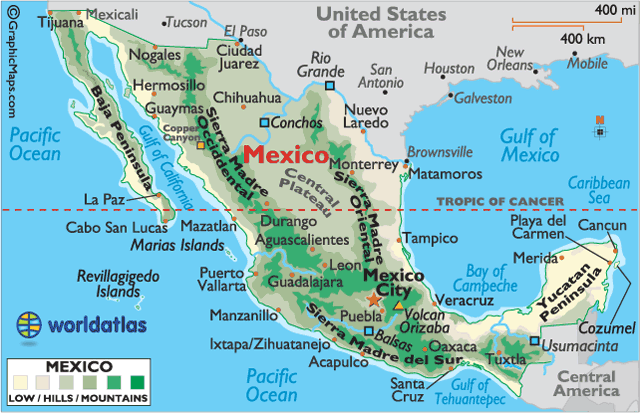The type of government that Mexico has is a Federal Republic. Similar to the United States, the Mexican federal government has three separate powers that control the government: the legislative branch, the executive branch, and the judicial branch. The legislative branch, the Congress of the Union, is composed of the Senate and the Chamber of Deputies. Congress has the power to impose taxes, pass laws, declare war, and approve the national budget (Mexico). The executive branch is controlled by the President of Mexico. Mexico is a democracy in which every Mexican citizen has free universal suffrage. Furthermore, all citizens are automatically registered to vote in each election due to the identity document (Mexico). The president serves for 6 years, and cannot be reelected after his term is over. The current president of Mexico is Felipe Calderon. The final branch of Congress is the judicial branch. The Supreme Court consists of 11 justices appointed by the president with Senatorial approval. The Supreme Court justices only serve for 15 years, and they cannot be reelected after their term is over (Mexico). Currently, the political agenda of Mexico is concerned with protecting the immigrants that are going to America (Miglierini). Laws such as the immigration laws passed in Arizona are of great concern to those in control of the Mexican government.
Although the President is the leader of the country, the real power rests with Congress. As said earlier, the Mexican Congress has the authority to pass laws. In 2009, a law was passed in Mexico that decriminalizes the possession of small amounts of narcotics. This law passed extremely easily with no outside opposition. The passing of this law shows the amount of power that Congress has, even with a conservative president who has tried to crack down on drug use (Time).
http://www.time.com/time/world/article/0,8599,1918725,00.html
Afro-Mexicans are no different than any other Mexican citizens. Every citizen in Mexico is equal. Citizens of African descent have the same suffrage and rights as any other Mexican citizen. From the research that has been done, I have noticed how similar the Mexican government is to the American government.
"Mexico." U.S. Department of State. Web. 17 Feb. 2012. <http://www.state.gov/r/pa/ei/bgn/35749.htm>.
Miglierini, Julian. "BBC News - Migration Key Issue as Mexico's Calderon Visits US." BBC News- Home. Web. 17 Feb. 2012. <http://news.bbc.co.uk/2/hi/8688916.stm>.

